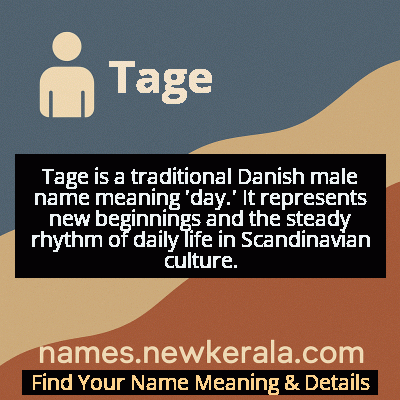Tage Name Meaning & Details
Origin, Popularity, Numerology Analysis & Name Meaning of Tage
Discover the origin, meaning, and cultural significance of the name TAGE. Delve into its historical roots and explore the lasting impact it has had on communities and traditions.
Name
Tage
Gender
Male
Origin
Danish
Lucky Number
6
Meaning of the Name - Tage
Tage is a traditional Danish male name meaning 'day.' It represents new beginnings and the steady rhythm of daily life in Scandinavian culture.
Tage - Complete Numerology Analysis
Your Numerology Number
Based on Pythagorean Numerology System
Ruling Planet
Venus
Positive Nature
Harmonious, responsible, caring, and artistic.
Negative Traits
Overly idealistic, superficial, possessive, or jealous.
Lucky Colours
Pink, turquoise.
Lucky Days
Friday.
Lucky Stones
Diamond, turquoise.
Harmony Numbers
2, 3, 9.
Best Suited Professions
Artists, musicians, teachers, healthcare workers.
What People Like About You
Warmth, nurturing nature, artistic flair.
Famous People Named Tage
Tage Erlander
Politician
Longest-serving Prime Minister of Sweden who established the modern Swedish welfare state
Tage Danielsson
Writer/Director
Influential Swedish satirist and co-founder of famous comedy group Galenskaparna och After Shave
Tage Frid
Woodworker/Educator
Renowned Danish-American furniture maker and influential woodworking teacher
Tage Skou-Hansen
Author
Prominent Danish novelist known for psychological novels and social commentary
Name Variations & International Equivalents
Click on blue names to explore their detailed meanings. Gray names with will be available soon.
Cultural & Historical Significance
The name's meaning of 'day' connects deeply with Scandinavian life, where the dramatic seasonal variations in daylight have shaped cultural practices, mythology, and daily routines. In countries like Denmark and Sweden, where winter brings long nights and summer offers nearly endless daylight, the concept of 'day' carries profound cultural weight. Tage as a name thus represents not just a time period, but the very rhythm of life in the Nordic region—encompassing both the practical necessity of daylight and the symbolic hope it represents.
Extended Personality Analysis
People named Tage are typically perceived as dependable, practical individuals with a strong sense of responsibility. Their personality often reflects the name's association with daylight—they tend to be clear-thinking, honest, and able to illuminate solutions to problems. Tages are usually methodical in their approach to life, preferring stability and routine over sudden changes, much like the predictable progression of days.
While they may appear reserved initially, Tages often possess deep emotional intelligence and loyalty to those they care about. They excel in roles requiring patience and persistence, and their grounded nature makes them excellent mediators and problem-solvers. The Scandinavian cultural influence often manifests in their appreciation for simplicity, quality, and functionality in both personal and professional spheres. Their strength lies in their reliability and their ability to bring consistency and order to any situation they encounter.
Modern Usage & Popularity
In contemporary Denmark and other Scandinavian countries, Tage maintains its status as a classic, respectable name that bridges traditional and modern sensibilities. While its peak popularity occurred in the mid-20th century, the name has experienced a modest resurgence as younger generations rediscover meaningful traditional names. It currently ranks as a solid, if not overwhelmingly popular, choice that appeals to parents seeking names with cultural heritage and simple elegance. The name's usage remains strongest in Denmark and Sweden, where it continues to be associated with reliability and Scandinavian identity, while being rare enough to maintain distinctiveness.
Symbolic & Spiritual Meanings
Symbolically, Tage represents illumination, new beginnings, and the cyclical nature of existence. As the embodiment of 'day,' it carries profound metaphorical weight—symbolizing hope after darkness, clarity after confusion, and renewal after rest. The name suggests someone who brings light to situations, whether through wisdom, honesty, or simple presence. In broader symbolic terms, Tage represents the journey of life itself, with each new day offering opportunities for growth and understanding. The name also carries connotations of reliability and consistency, much like the dependable return of daylight, making it symbolic of steadfastness and enduring strength.

